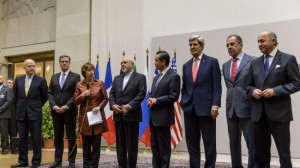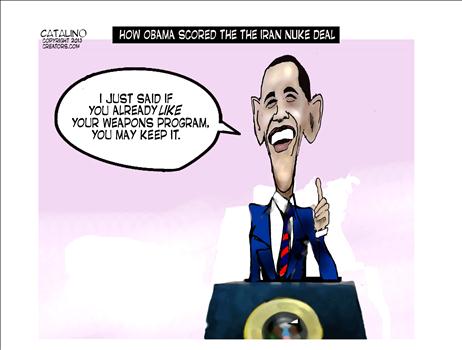Obamacare has been so front and center lately—and will continue to be so because of its effect on everyone—that our foreign policy with respect to Iran has taken a back seat in the public’s mind. Foreign policy usually takes a back seat, as we’re nearly always more concerned about what we see happening here at home. Yet what happens here in the future is vitally connected to what’s happening over there.
 We have blustered for years now about Iran’s development of nuclear weapons. Presidents Bush and Obama have pledged not to allow such development, the basis for that concern being the radical Islamic ideology that motivates Iran. The first country to be menaced by any nuclear weapons in Iran will be Israel, which is our only staunch ally in the Middle East. Turning our backs on Israel would be a betrayal of the highest magnitude, yet this new “deal” that the Western nations have just agreed to with Iran seems to do just that.
We have blustered for years now about Iran’s development of nuclear weapons. Presidents Bush and Obama have pledged not to allow such development, the basis for that concern being the radical Islamic ideology that motivates Iran. The first country to be menaced by any nuclear weapons in Iran will be Israel, which is our only staunch ally in the Middle East. Turning our backs on Israel would be a betrayal of the highest magnitude, yet this new “deal” that the Western nations have just agreed to with Iran seems to do just that.
Benjamin Netanyahu, Israel’s prime minister, calls this deal a “historic mistake.” James Carafano, in National Review, calls this “Munich II,” the classic sellout of Czechoslovakia by the Western powers to Hitler in 1938. The first Munich rested on the “ridiculous notion that Hitler could be satiated.” Carafano says it is “equally ludicrous” to believe that Iran is really open to giving up its nuclear development. Sanctions were working, to some extent; that’s what brought the Iranians to the table. Now, in this new deal, we are easing most of those sanctions. Carafano then writes about the two different worldviews in our approach to Iran: realism vs. idealism.
The realists, he says, know that sanctions were only there for one reason: bring down this regime. Idealists believe that sanctions were the “magic button” that would make the Iranians reasonable. He continues:
The parting of the ways between realists and idealists is not about two different visions of the path to a peaceful future. In the case of this particular foreign-policy conundrum, the realist approach is based on a full awareness of whom the West is really dealing with. The idealists’ assessment is delusional. . . .
The only “fact” offered so far to prove that the pact will lead to something other than a good deal for Iran is the blithe assurance that the deal was negotiated by really smart people who know what they are doing.
Are these the same “smart people” who orchestrated our response to Benghazi? We also need to realize that President Obama has a soft spot for Islamic radicalism and a seething disdain for Israel. How comforting is that? He’s always been far more willing to negotiate with Islamists than with others he perceives as his enemies:
I, for one, am not in my comfort zone when I think about his negotiating skills and his promises:
Obama is one of those idealists Carafano wrote about, who think the Iranians will see the light, and with whom we can negotiate in good faith. As he said, this is delusional:
Then again, maybe we just don’t know how clever he and John Kerry have been in all this. Perhaps we don’t understand their trump card:
Yes, that might do it—a sure pathway for the destruction of any enemy.




